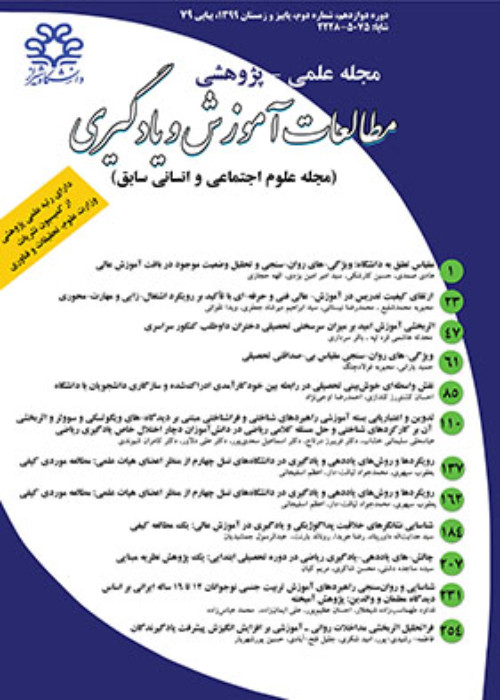The Mediating Role of Motivational Self-Regulation in the Relationship between Academic Emotion of Hope and Academic Well-Being
In the realm of positive psychology, well-being serves as a cornerstone of positive performance, fostering personal growth and enhanced capabilities. Academic well-being, a state characterized by enthusiasm, energy, and a deep commitment to academic pursuits, plays a crucial role in shaping the educational experience. Numerous studies have explored the factors influencing academic well-being, with hope emerging as a compelling element. Snyder's theory of hope offers a comprehensive framework for understanding this concept. According to Snyder, academic hope encompasses the belief in one's ability to formulate effective strategies to achieve goals, the motivation to utilize these strategies, the capacity to sustain positive emotions, and the perseverance to persist in the face of challenges and complete academic endeavors. Students who possess academic hope tend to experience lower levels of distress and psychological stress, contributing significantly to their academic success. Beyond the direct impact of hope, it is crucial to elucidate the mechanisms through which it influences academic well-being. Snyder's theory (1995) suggests a close association between hope and self-regulation. Motivational self-regulation refers to the intentional adjustments individuals make to their motivation to engage in tasks, accomplish goals, or reach specific objectives. Comprehending the role of motivational self-regulation in the relationship between hope and academic well-being is essential for a comprehensive understanding of this complex phenomenon. Given the multifaceted nature of factors affecting academic well-being, a unidimensional and linear approach is insufficient to unveil the underlying processes. Instead, a deeper exploration that considers indirect relationships among variables is paramount. Investigating mediating factors, such as motivational self-regulation, provides valuable insights into the complex dynamics of academic well-being. Thus, the primary objective of this research is to examine the mediating role of motivational self-regulation in the relationship between academic hope and academic well-being. By examining this indirect pathway, we aim to gain a deeper understanding of the processes through which hope fosters academic well-being and contributes to overall academic success.
The present study employs a correlational research design to investigate the structural relationships between the variables using the method of structural equation modeling. The statistical population comprises all students from the first secondary school in Marvdasht who were enrolled in the 2020-2021 academic year. The sample size for this study was determined to be 393 individuals, selected via a random cluster sampling method. Consequently, out of the 13 first secondary schools in the city, 4 schools (comprising 2 girls' schools and 2 boys' schools) were randomly chosen, and a majority of the students from these 4 schools participated in the study. The sample size was determined based on Kline's (2016) recommendation, which suggests that the appropriate sample size for a structural equation modeling test should be 10 to 20 times the number of parameters in the research model. The inclusion criteria for the study were informed consent from the participants and enrollment in the specified academic year, while the exclusion criteria were a history of specific physical and mental illnesses (based on self-reporting by the subjects) and incomplete questionnaires. Ethical considerations in this study included informing the participants about the purpose of the research, ensuring their complete freedom to participate or not participate in the research, obtaining informed consent, and guaranteeing confidentiality. The participants' age range was between 13 and 15 years, with a mean and standard deviation of 13.45 and 0.97 years, respectively. The sample consisted of 205 female participants (52.16%) and 188 male participants (47.84%).
The research model demonstrated a good fit with the collected data, indicating that the proposed relationships between the variables were supported by the empirical evidence. Moreover, the direct effects of academic emotion of hope on both motivational self-regulation and academic well-being were significant, suggesting that higher levels of hope were associated with enhanced self-regulation and academic well-being. Similarly, the direct effect of motivational self-regulation on academic well-being was also significant, highlighting the role of self-regulation in promoting academic well-being. Notably, the effect of academic emotion of hope on academic well-being was significantly mediated by motivational self-regulation. This finding underscores the mediating role of motivational self-regulation, suggesting that hope indirectly influences academic well-being through its impact on self-regulation. In essence, the results indicate that motivational self-regulation serves as a crucial pathway through which academic emotion of hope contributes to enhanced academic well-being.
The objective of this study was to examine a causal model concerning the mediating role of motivational self-regulation in the relationship between the academic emotion of hope and academic well-being, utilizing structural equation modeling. The findings revealed that the academic emotion of hope had a direct and positive influence on academic well-being. This finding can be interpreted as the academic emotion of hope being related to learners' cognitive expectations of achieving desirable outcomes, such as securing favorable opportunities and life skills. Consequently, learners with high levels of hope set goals, identify the means to attain them, and generate the necessary motivation to achieve these goals. Additionally, the research found a positive and significant effect of the academic emotion of hope on motivational self-regulation. Other findings include the positive impact of motivational self-regulation on academic well-being, both directly and as a mediator. In summary, the results underscore the importance of the variables of academic excitement, hope, and motivational self-regulation in predicting academic well-being. Given that this research employed a correlational design, it is not possible to draw causal inferences from it. It is recommended that the model of this study be examined among students and learners from different cultural contexts to enhance the generalizability of the results.
- حق عضویت دریافتی صرف حمایت از نشریات عضو و نگهداری، تکمیل و توسعه مگیران میشود.
- پرداخت حق اشتراک و دانلود مقالات اجازه بازنشر آن در سایر رسانههای چاپی و دیجیتال را به کاربر نمیدهد.


